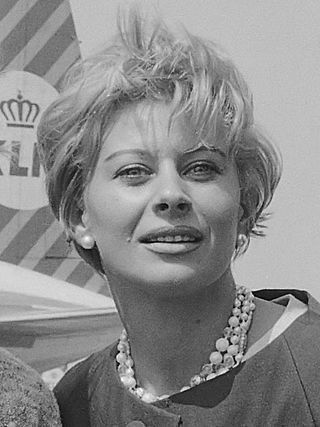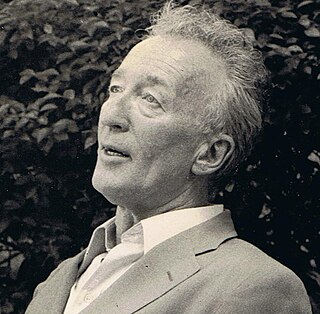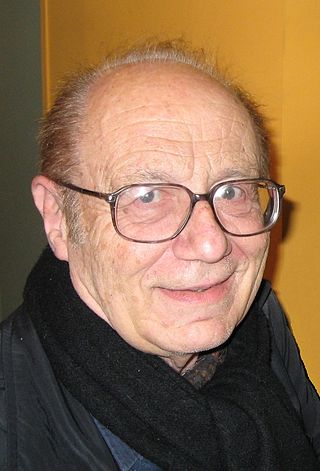Related Research Articles
Oulipo is a loose gathering of (mainly) French-speaking writers and mathematicians who seek to create works using constrained writing techniques. It was founded in 1960 by Raymond Queneau and François Le Lionnais. Other notable members have included novelists Georges Perec and Italo Calvino, poets Oskar Pastior and Jean Lescure, and poet/mathematician Jacques Roubaud.

Boris Vian was a French polymath – i.e., writer, poet, musician, singer, translator, critic, actor, inventor, and engineer – who is primarily remembered for his novels. Those published under the pseudonym Vernon Sullivan were bizarre parodies of criminal fiction, highly controversial at the time of their release due to their unconventional outlook.

Jean Genet was a French novelist, playwright, poet, essayist, and political activist. In his early life he was a vagabond and petty criminal, but he later became a writer and playwright. His major works include the novels The Thief's Journal and Our Lady of the Flowers and the plays The Balcony, The Maids and The Screens.
Stanley Chapman was a British architect, designer, translator and writer. His interests included theatre and 'pataphysics. He was involved with founding the National Theatre of London, was a member of Oulipo of the year 1961, founder of the Outrapo and a member also of the French Collège de 'Pataphysique, the London Institute of 'Pataphysics and the Lewis Carroll Society. In the early 1950s he contributed poems and designed covers for the literary magazines Listen and Stand and contributed translations to Chanticleer, a magazine edited by the poet Ewart Milne. His English translation of A Hundred Thousand Billion Poems was received with "admiring stupefaction" by Raymond Queneau.

Juliette Gréco was a French singer and actress. Her best known songs are "Paris Canaille", "La Javanaise" and "Déshabillez-moi" (1967). She often sang tracks with lyrics written by French poets such as Jacques Prévert and Boris Vian, as well as singers like Jacques Brel and Charles Aznavour. Her 60-year career came to an end in 2015 when she began her last worldwide tour titled "Merci".

Magali Noëlle Guiffray, better known as Magali Noël, was a French actress and singer.
Louis Pauwels was a French journalist and writer.

Claude Roy was a French poet and essayist. He was born and died in Paris.
Michèle Arnaud, was a French singer, recording artist, and director. She was buried on 18 September 1998 at Montparnasse Cemetery. She is the mother of the singer Dominique Walter and the photographer Florence Gruère.
Michel, chevalier de Cubières was an 18th-century French writer, known under the pen-names of Palmézaux and Dorat-Cubières, taking the latter name as he had Claude Joseph Dorat as his master.

Antoine Jay was a French writer, journalist, historian and politician.

Jacques Decour, was a French writer, Germanist, essayist, translator and resistant fighter, executed by the Nazis.

Denise Desautels is a québécoise poet and writer.

Jean-Noël Alexandre Robert is a French orientalist, specialist of the history of Buddhism in Japan and of its Chinese predecessors. His work particularly focus on Tendai and the philology of Sino-Japanese Buddhist texts. He is the author of the French translation of the Lotus Sūtra, seminal text of Mahayana 大乘, from the ancient Chinese text.
Jean-Pierre Néraudau was a 20th-century French writer and professor of Latin literature.
The prix Contrepoint is a French literary award established in 1971 by a group of young French novelists and journalists. Each year a French-speaking novelist is selected.
The grand prix catholique de littérature is a French literary prize awarded by the Association des écrivains catholiques de langue française.

Pierre Bourgeade was a French man of letters, playwright, poet, writer, director, journalist, literary critic and photographer. A descendant of Jean Racine, he was also the brother-in-law of the writer Paule Constant.
La Bibliothèque oulipienne is a collection that hosts the works of the individual and collective members of the Oulipo. The short texts that compose them form a fabrique of playful literary creations.

Annie Le Brun is a French writer, poet and literary critic.
References
- ↑ Noël Arnaud, "Introduction," in Vian, Boris (1972). Noël Arnaud (ed.). Je voudrais pas crever (suivi par "Lettres au Collège de 'Pataphysique," "Textes sur la littérature"). Paris: 10/18. pp. 5–6. ISBN 978-2-264-00830-5.
- ↑ Rybalka, Michel (1968). "Boris Vian et le monde sensible". The French Review . 41 (5): 669–74.
- ↑ Released on Polydor Records, #2392010. "1972 Calendars from France". The French Review . 45 (2). 1971.
- ↑ Perrin, Ludovic (2001-01-06). "L'ascension d'Eiffel". Libération (in French). Retrieved 2009-08-29.
- ↑ Marillier, Élodie (2009-04-30). "2009, Vian habillé de neuf". Le Point (in French). Retrieved 2009-08-29.
- ↑ "Loustal: Je voudrais pas crever". Loustal.nl. 2008. Retrieved 2009-08-29.
- ↑ "Le FIL célèbre Gabrielle Roy et Boris Vian". Canadian Broadcasting Corporation. 2009-08-25. Retrieved 2009-08-29.
- ↑ "Je voudrais pas crever de Boris Vian vu par 20 artistes contemporains: Exposition". Festival international de littérature. 2009. Archived from the original on 2009-08-30. Retrieved 2009-08-29.